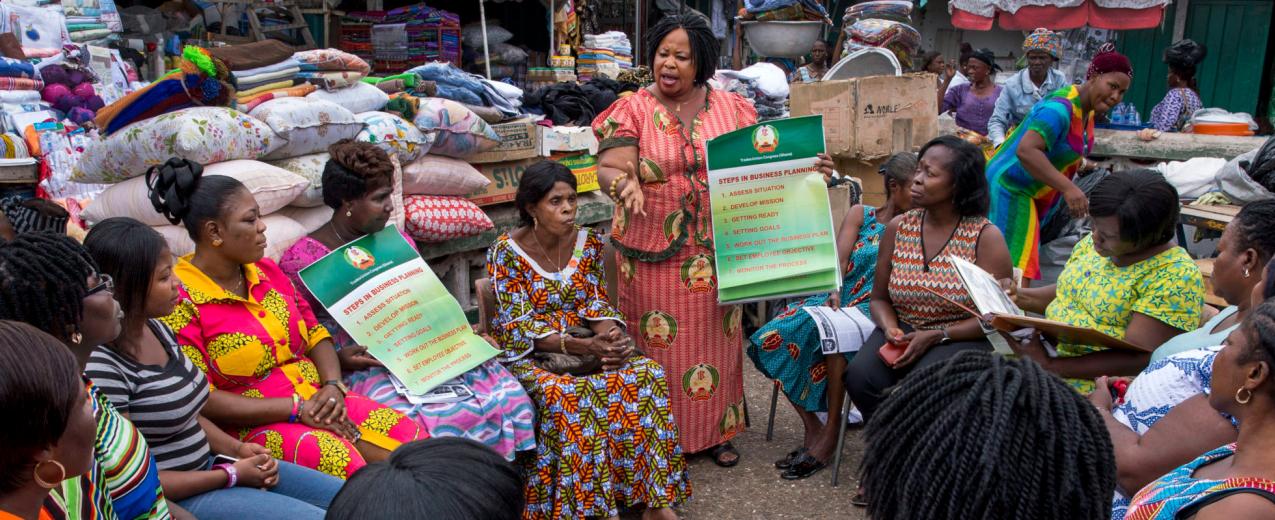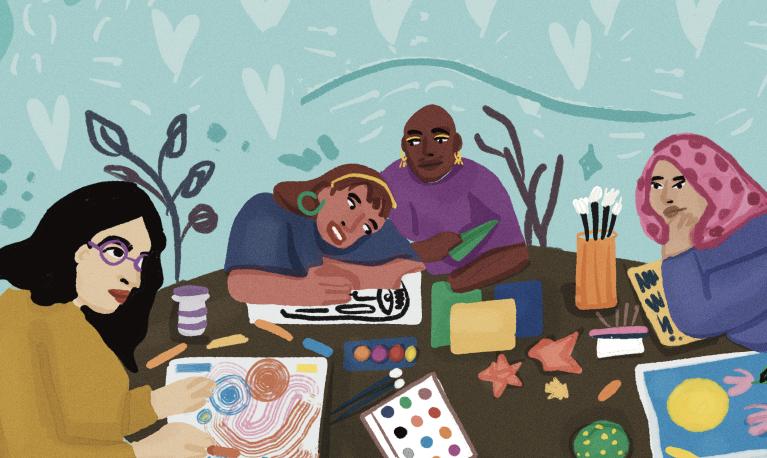
- Blog
- 1 juillet 2021
Ending gender-based violence in the workplace: the need to shift norms
- Author: Rachel Marcus
- Published by: ALIGN
As the Generation Equality Forum gathered in Paris to debate action for immediate and permanent equality, Rachel Marcus argues the need for shifts in the norms that fuel gender-based violence in the workplace.
As ILO Convention 190 on eliminating violence and harassment in the world of work recognises, everyone has the human right to freedom from violence at work. The Convention came into force only last month, in June 2021, and has already been ratified by seven countries: Argentina, Ecuador, Fiji, Mauritius, Namibia, Somalia, and Uruguay.
Such legal frameworks help countries to harmonise their own laws in ways that support the right to freedom from violence. Adopting and ‘domesticating’ international conventions and making sure that everyone – employers, the justice system and wider society – is aware of their responsibilities under these laws, is vital to shift the norms that fuel gender-based violence (GBV) in the workplace.


Gender-based violence continues on a huge scale in workplaces worldwide
GBV in the workplace is a global problem that crosses continents and sectors. Research by the UK’s Trade Unions Congress, for example, found that over half the women they interviewed had experienced sexual harassment; rising to almost two-thirds (63%) among women aged 18-24. Among women working in the horticulture sector in Tanzania, an ILO report reveals that up to 89% had witnessed sexual harassment. Worldwide, the least powerful workers – often those who are already marginalised – tend to face the greatest risk of violence.
Recent research supported by ALIGN reinforces the urgent need to shift the norms that underpin violence at work. Over the past six months, winners of ALIGN micro-grants in Cameroon, Malawi, Nigeria, Nepal and Zimbabwe have examined how gendered social norms underpin violence against women in a range of sectors. These span both formal and informal workplaces, from artisanal mining, agricultural and domestic work, to healthcare, the technology sector, and local and national government. In addition, research in Rwanda focused on those who identify as LGBTQI+ and their experience of violence in civil society organisations.
Three studies, in particular, conducted surveys to understand the scale of the problem, with shocking results.
- In Zimbabwe, between 68 and 85% of women working in artisanal mining settlements in three provinces reported experiencing some form of GBV. Physical violence, sexual harassment and emotional abuse were the most common forms of violence, with many respondents reporting that they had experienced multiple forms of abuse.
- In Cameroon, a survey of one hospital in Buea found that 43% of the female health sector workers who were interviewed reported experiencing physical violence at work, and 21% had experienced sexual violence.
- In Rwanda, 74% of LGBTQI+ respondents working in civil society organisations in Kigali reported experiencing emotional abuse and discrimination at work.
Violence and discrimination are rooted in gender norms
Participants in these and four additional qualitative studies have identified norms that contribute to GBV across these diverse workplaces and sectors. It is clear from their responses that pervasive patriarchal norms continue to give men more power, and that women are still expected to be submissive. As one woman parliamentarian in Nepal puts it:
‘The society we have been brought up in has given all decision-making and economic rights to men… The parliament is built with people from this society so the belief and understanding there is a reflection of the society.’
Norms that naturalise gender inequality have left men feeling that they can act with impunity and women feeling that they should tolerate violence. They also mean that different kinds of violence are seen as normal – and that people ignore it because it is so common. As a woman agricultural labourer in Malawi reports:
‘It started way back. I also got used to it and I don’t feel anything. There is nothing that is happening [if violence takes place] and I am just used to it.’
The studies from Malawi on domestic workers and Nigeria on workers in the information and communications technology (ICT) sector also highlight how different norms and power inequalities intersect with these gender-based norms. Both studies reveal norms of deference to older people, and to people more senior in workplace hierarchies, which compound the risk that younger and more junior women will experience violence, and make it harder to report.
The Malawi study also highlights the impact of precarious working conditions: the domestic workers interviewed often feel unable to resist advances from their bosses or co-workers (such as guards or gardeners), or to complain about physical violence, for fear of losing their job. In Zimbabwe, women in artisanal mines – who are often driven to this work because of a lack of any other opportunities – highlight their vulnerability to sexual attacks from gangs of machete-wielding men.
Several studies have also revealed the lack of action from employers, and in one case, complicity from the police, who demand sexual favours in exchange for action in cases of assault. This problem seems particularly acute in informal workplaces. Formal sector workplaces (such as hospitals, technology companies and civil society organisations) seem more likely to have complaint mechanisms in place and respondents identified some instances where complaints had led to action, for example in ICT sector businesses in Nigeria.


Ways forward
The research teams and participants have identified potential ways to start shifting the norms that lead to acceptance of gender-based violence at work, coupled with complementary actions that could, together, bring about change. The research in Rwanda found that where employees were asked to sign a document on the protection of vulnerable groups at work, LGBT+ staff members were four times less likely to experience any form of GBV at work.
The Nigeria research suggested gaps between the public and private sectors in terms of the level of implementation of codes of conduct, signalling the need for a sharper focus on implementation in the public sector. While corruption and reporting challenges can undermine the impact of such codes (as reported by some interviewees in Cameroon), the ALIGN studies conclude that workplace anti-GBV policies have a role to play and recommend that they be strengthened.
All researchers have stressed the need to implement existing laws that criminalise GBV, and to amend them where necessary to cover neglected issues (such as cyber-violence or, in one case, sexual assault). Most fundamentally, every study recommends investing in education about gender equality: in workplaces, in schools and in wider society. This investment could take the form of specific workplace training for formal sector staff in hospitals, technology companies or councils and in parliaments. It could also form a component of wider educational programmes for disadvantaged workers in the informal sector, many of whom have been unable to complete basic education.
In short, the ALIGN micro-grants have revealed shockingly high levels of GBV in the workplace, and the urgent need for far-reaching change. Over the past month grantees have been sharing their findings with key local stakeholders to spark vital and long overdue changes in norms, practices and policies to eliminate GBV at work once and for all.
About the author


Rachel Marcus, ALIGN Senior Technical Advisor, leads ALIGN’s education and economic empowerment workstreams. Before joining ODI, she worked for Save the Children, DFID and as a consultant on approaches to gender equality and social inclusion. In recent years she has led evidence synthesis projects on issues including anti-discrimination policies and programmes, gender-equitable masculinities and girls’ empowerment programmes.
- Countries / Regions:
- Global
Blog
14 avril 2025

Report
5 mars 2025

Blog
10 février 2025
